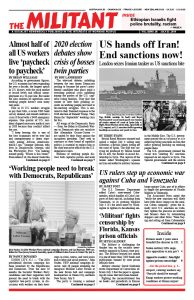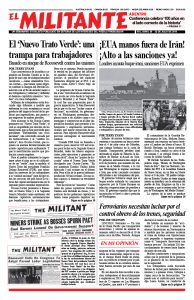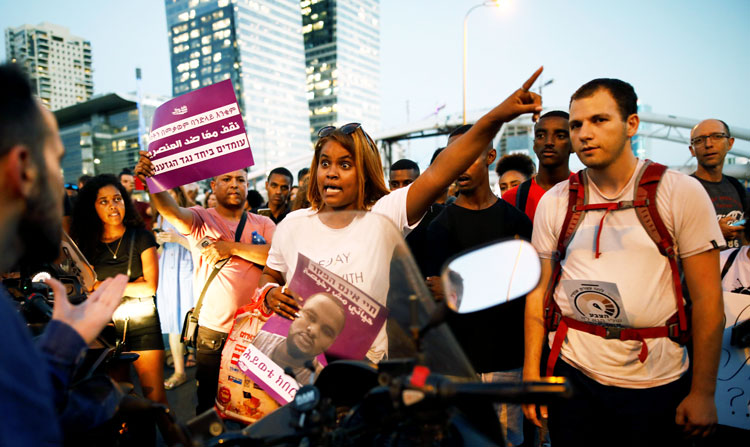Thousands of Ethiopian Israelis have taken to the streets across Israel since June 30, when an off-duty cop shot and killed unarmed 19-year-old Solomon Tekah in Haifa.
“Since I’m 13, I’ve been beaten by cops,” Aviel, 19, told Haaretz at a July 2 rush-hour protest in Tel Aviv, one of many that blocked traffic across the country. He described being harassed by cops just because he is black. Another young protester added that some cops “think they can do anything, like they are God.”
By July 3, 136 protesters had been arrested. Police say 47 cops and 26 protesters were injured during the clashes over several days.
“This is not the first incident of a young Ethiopian being treated brutally,” Efrat Yerday, a leader of the Association of Ethiopian Jews, told the press July 2. In response to police saying they would hire more Ethiopian cops to better understand “their culture,” she said, “It’s not about culture, it’s about police violence, it’s about racism and [racial] profiling.”
Thousands protested in January after cops killed 24-year-old Ethiopian Yehuda Biadga, who was suffering from psychological problems. Thousands took to the streets in 2015 after a video showed police beating Damas Pakada, an Ethiopian Jewish soldier who was wearing his Israeli army uniform.
Little has changed, Yerday said.
The cop said he feared for his life and fired one shot, which ricocheted off the ground and killed Tekah, after rocks were thrown at the cop when he tried to break up a fight. “We don’t believe the police,” Yerday said. Even if there was a fight, she said, “You don’t take a gun out on children.”
The cop is under house arrest after the shooting, but hasn’t been charged.
In an attempt to undercut the protests, the cops leaked to the media that Tekah had once been convicted of theft. “When the police are briefing the media about Solomon’s criminal past,” a member of his family told the Jerusalem Post, “for us they murder him again. Let’s assume that he had a certain past, is that a reason to kill him?”
Operation Moses
For much of the early history of Israel, Ethiopians Jews weren’t considered by authorities as real Jews, and were denied the right to return. This changed in the 1970s, and in November 1984 the Israeli government began Operation Moses, which brought some 6,500 Ethiopian Jews. In 1991 the Israeli government brought another 14,000.
From the start, Ethiopian Jews faced racist discrimination in every aspect of life — from housing and jobs to education — as well as police brutality.
Today there are some 150,000 Israeli citizens of Ethiopian descent — about 1.7% of Israel’s 8.5 million people — and at least 40% are “sabras,” meaning they were born in Israel.
More than 35% of Ethiopian Israeli families live under the official poverty line, and Ethiopian youth are arrested three times more frequently than other youth.
“Sometimes we call on the phone and they say they have an open position,” Michal Avera Samuel, executive director of the Association for Education and Social Integration of Ethiopian Jews, told the Militant July 10 from Lod. “But then when we arrive for the job interview, they tell us the position has been filled.”
“There was no organization behind these protests,” she said. “It was young people who are not willing to be quiet. They said enough!”
This is part of the reality of the class struggle in Israel, where Jews from Africa and Arab citizens of Israel face racial discrimination, which bosses use to try and weaken the working class.
“We support any demonstration against racism,” Yaniv Bar Ilan, a spokesperson for the trade union federation Koach LaOvdim, which includes many Ethiopian members, told the Militant by phone from Tel Aviv July 8.
There are 15 private bus companies in Israel, he said, and the bosses have been driving down wages and work conditions. “As a result, workers from the lower income levels have taken the place of European-origin drivers. Half the bus drivers in Israel are now Arabs,” Bar Ilan said. “And a growing number are Ethiopian Jews. They are exposed to racism on a daily basis.”
“We saw a lot of understanding from the Arab bus drivers,” he said about the highway protests. “In many cases they didn’t stay on the bus, but got off to show they supported the protests.”
Jerusalem Post writer Dov Lipman described similar solidarity from other Jews, when he was stuck on a bus for five and a half hours at one of the roadblock protests.
“Tens of thousands of people sat in traffic — missing weddings, memorial services, army ceremonies, work, etc. — and held in their anger for hours because they identified with the demonstrators,” he wrote.


